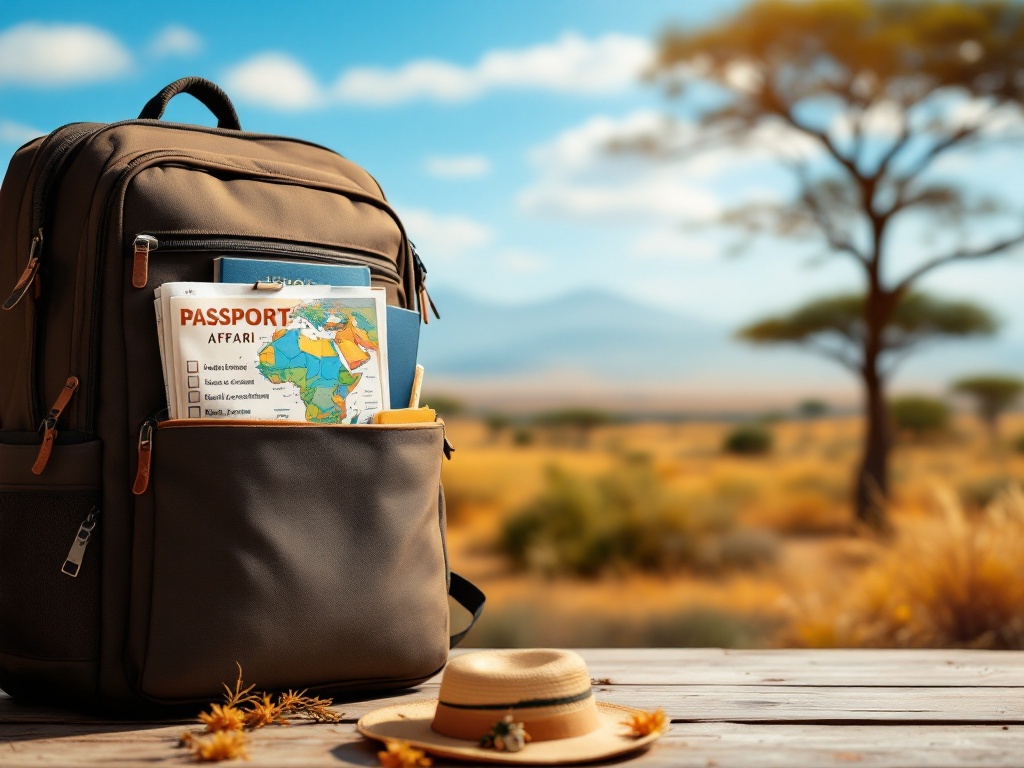What Documents Do I Need to Travel to Africa?
Dreaming of an African safari? Before you pack your bags, navigate the crucial entry requirements for a smooth journey. Passport validity, visa regulations, and health documentation vary significantly by country. This guide provides essential information on everything from Electronic Travel Authorizations (ETAs) and visa-on-arrival options to specific requirements for minors and vital health documentation. Prepare for your adventure and avoid last-minute surprises – discover the key steps to ensure hassle-free travel to Africa.
Important information

- A valid passport is essential, with an expiry date at least six months beyond your return date. South Africa strictly enforces this rule.
- Visa requirements vary by country. Check with the specific country’s embassy, consulate, or a visa service for the latest information.
- If traveling from a yellow fever risk area, you’ll need an International Certificate of Vaccination (ICVP), also known as a “yellow card.”
- Travel insurance is highly recommended and often required. It covers medical emergencies, cancellations, and other unforeseen problems.
- Proof of onward travel (like a return ticket) and a detailed itinerary, including accommodation, are often required by immigration.
Africa Entry Requirements
Planning an African adventure? A valid passport is essential, but visa requirements vary depending on your destination. Each country has its own specific regulations, so it’s crucial to check them in advance. Ensure your passport’s expiration date is well beyond your travel dates. For the most up-to-date entry requirements, consult the relevant embassy or consulate, or a reputable visa service.
Check the specific visa requirements for your chosen African destination. They vary from country to country.
Ensure your passport’s validity extends well beyond your intended travel dates.
Consult the relevant embassy, consulate, or a reputable visa service for the most current entry requirements.
General Passport Requirements
For your trip to Africa, ensure your passport is valid for six months after your return date. South Africa is especially strict about this rule. You also need two blank visa pages for entry and exit stamps or any visas required during your trip.
Valid Passport and Visa Requirements
Planning an African adventure? A valid passport is essential for your journey. Many countries require visas, so check the specific regulations with each nation’s embassy or consulate. Some countries also mandate specific vaccinations, ensure you are up-to-date with the necessary health requirements. Ensure your passport remains valid for six months beyond your intended return date and has enough blank visa pages for all the countries you plan to visit. With a little foresight, your African adventure will be hassle-free.
Specific Country Visa Requirements
African visa requirements vary significantly depending on the country. Some nations offer streamlined processes, while others require more extensive preparation.
Electronic Travel Authorization (ETA)
Kenya utilizes an Electronic Travel Authorization (ETA) system.
Visa Obtained Beforehand
Uganda mandates a visa obtained beforehand.
Visa Upon Arrival
- Rwanda provides visas upon arrival.
- Tanzania provides visas upon arrival.
- Zimbabwe provides visas upon arrival.
Advance Research Required
- Travelers planning trips to Congo should research visa policies in advance.
- Travelers planning trips to Malawi should research visa policies in advance.
- Travelers planning trips to Mozambique should research visa policies in advance.
South Africa has unique entry and exit regulations. Regulations can differ based on nationality and purpose of visit. Always consult official government websites or embassies for the latest information to ensure proper documentation.
South Africa Entry and Exit Requirements
For your trip to South Africa, ensure your passport is valid for at least six months after your intended departure date. You also need two blank visa pages available in your passport. If you are traveling from a country with a risk of yellow fever, a valid International Certificate of Vaccination is required.
Kenya: Electronic Travel Authorization (ETA)
Planning a trip to Kenya? You’ll need an Electronic Travel Authorization (ETA). The ETA costs US$52.50. To apply, gather your passport, a recent photo, flight details, and some personal information. Apply up to three months in advance, but no later than 72 hours before your departure. This ETA covers single or multiple entries and even allows you to explore specific other East African nations, as long as you don’t leave the region.
Uganda: Advance Visa Requirement
Plan your trip to Uganda by securing a visa in advance through the official government website. The visa fee is US$50 per person.
Rwanda, Tanzania, and Zimbabwe: Visa on Arrival Options
Rwanda and Zimbabwe offer visas on arrival for eligible nationalities. Tanzania also provides visas upon arrival, but you can apply in advance through their embassy or consulate for specific requirements based on your citizenship.
Congo, Malawi, and Mozambique: Visa Recommendations
Planning a trip to Congo, Malawi, or Mozambique? Secure your visa in advance for a smooth and hassle-free journey. This is crucial for entry and avoids potential complications upon arrival.
Visa Exemptions and Special Visas
Traveling to East Africa offers different visa options depending on your nationality. Some travelers enjoy visa-free access, while others need specific visas. The UniVisa allows entry to Kenya, Rwanda, and Uganda. For tourism exceeding 90 days, the East Africa Tourist Visa provides multiple entries to these same countries.
UniVisa for Multiple Countries
Explore East Africa with ease using the UniVisa. This single application grants access to Kenya, Rwanda, and Uganda, simplifying your travel planning. Remember to check the latest entry requirements with the relevant embassies, consulates, or a reputable visa service for the most up-to-date information.
East Africa Visa
Explore East Africa with the East Africa Tourist Visa. This convenient travel document grants access to Kenya, Rwanda, and Uganda, simplifying travel between these countries. Apply online for a hassle-free experience.
Travel Documentation for Minors
Planning an African adventure with your kids? Ensure smooth travels by having the necessary paperwork. Each child needs a valid passport, and some countries may also require a visa. A crucial document is an unabridged birth certificate, issued in English. Solo parents should be prepared to present written consent from the other parent, along with a copy of their passport. Remember, entry requirements vary by country, so check the specific regulations for your destination to avoid any last-minute surprises. Here’s a checklist to help you prepare:
- Valid passport for each child.
- Visa (if required by the specific country).
- Unabridged birth certificate issued in English.
- Written consent from the other parent, along with a copy of their passport (for solo parents).
Always check the specific entry requirements for your destination country.
Child Travel Documents and Parental Consent
Traveling internationally with minors requires specific documentation. Ensure you have the following:
- A valid passport for the minor.
- Notarized parental consent, often required for international travel with minors.
- If one parent is not traveling, their consent is necessary, typically through an affidavit or court order.
- An unabridged birth certificate naming both parents is usually mandatory.
Because these requirements can vary, contacting the destination country’s embassy or consulate beforehand is strongly advised.
Unabridged Birth Certificate Requirements
An unabridged birth certificate is essential for establishing parentage and is often required for minors traveling to certain African countries. This document verifies the child’s identity and provides crucial parental information. This is particularly important for international travel, as some nations require it to combat child trafficking. Remember to always check the latest travel advisories for your destination before departure, as specific regulations vary.
Health and Vaccination Documentation
Planning a trip to certain African nations? A yellow fever vaccination certificate might be necessary. This crucial document, officially known as the International Certificate of Vaccination or Prophylaxis (ICVP), or “yellow card,” records your vaccinations and is recognized globally. While some countries demand it for entry, requirements differ, so check your destination’s specific needs. You might need additional vaccinations or a visa, so plan ahead and secure the right paperwork.
Yellow Fever Vaccination Certificate
Planning a trip to certain African nations? A Yellow Fever Vaccination Certificate might be required, particularly if you’re arriving from a high-risk region. The certificate takes effect 10 days post-vaccination and provides lifelong protection. Consult your doctor or visit a travel clinic at least 10 days prior to your departure for your vaccination and certificate. Some countries may deny entry without this documentation.
International Certificate of Vaccination
Traveling from a yellow fever-affected area to South Africa? Bring your International Certificate of Vaccination (ICV). This certificate is mandatory for entry if you are arriving from a WHO-designated high-risk zone.
Additional Travel Documentation
Immigration officials typically require proof of onward travel, such as a return ticket, demonstrating your intention to leave.
A detailed itinerary, including accommodation details, further strengthens your case.
Travel insurance is strongly advised and should cover medical emergencies and other unforeseen issues.
Keep copies of these documents, along with emergency contact information, readily accessible.
Any non-English documents must be accompanied by certified translations.
Valid Return Tickets
A valid return or onward ticket is essential for your trip, as it proves your intention to leave the destination country. Airlines and immigration officials may ask for this documentation, so it’s recommended to have it readily available.
Travel Itinerary and Insurance
Planning a trip to Africa? A detailed itinerary is essential, and so is travel insurance. Many countries require it, and for good reason. It protects you from a range of unexpected issues, from medical emergencies and trip cancellations to lost luggage. Adequate coverage is key to a worry-free African adventure. Travel insurance offers crucial protection for your trip, covering potential medical emergencies, trip cancellations, and even lost luggage. It ensures a smoother, more secure experience, allowing you to focus on enjoying your African adventure.

















